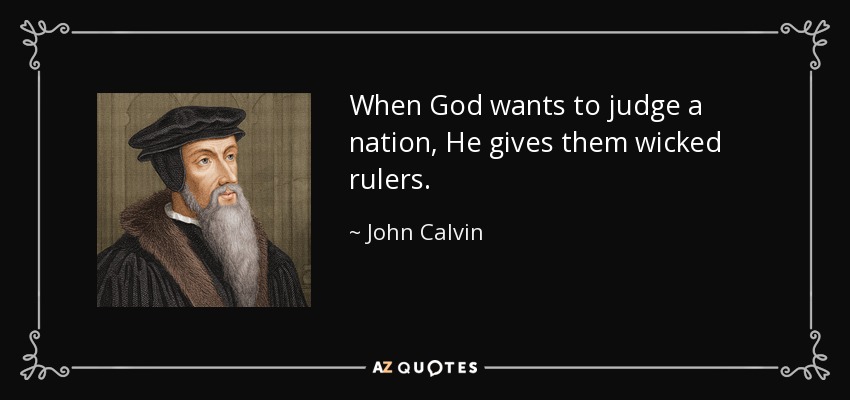"The Lord will smite you with madness"
(Deut 28: 28)
It has never happened before. People killing one another on a vast worldwide scale. Such an event seems preposterous. Surely that can never happen. All peace gone? Could that really happen? What could possibly cause such a stupendous phenomenon?
We have already seen that it is the sin of man that brings God to withdraw his merciful restraints upon the wicked and their enterprises. We have called attention to the nature of the sinful behavior of the last generation, that "wicked and adulterous generation," the generation that shall experience the judgments of the Apocalypse, and how it reaches its fullness in that final generation and precipitates the end time judgments.
As I have observed, something drastic must happen to the psychology of the men of that final society. I have pondered this difficulty much. The commentaries offer little help here. I can speculate about several possibilities, but will save doing so till we have considered several important points first.
End Time Madness
All can agree that a kind of insanity and chronic paranoia must be present in the end time masses to bring them to slaughter one another violently. We should all also agree that such insanity is a judgment of God. Peace given by God is a blessing. Peace taken away by God is a curse and a judgment. So, will God cause end time insanity during the time of the red horse rider? I think so. Notice these words:
“The Lord will smite you with madness, blindness and with bewilderment of heart." (Deut 28: 28)
"Madness" may be translated as "craziness" (Strong), or as insanity or lunacy. The judgment of God turns men into "raving maniacs."
In the previous chapter we saw how God gives wicked rulers to a people as a judgment for their sins. We cited Calvin on this point and showed several scriptures that upheld that idea. But, not only is the giving of such wicked rulers a judgment of God, but so also is his causing people to go mad. This is what we see happening under the administration of the red horse rider's judgment. It is a deadly prognosis for a society. Oh the insanity of the last days! The destructive paranoia!
When God intends to destroy a people for their rebellion he will not only send them wicked rulers but will also send them insanity. This truth was even recognized by the heathen. Notice these words:
"For those whom God to ruine has design’d,
He fits for Fate, and first destroys their Mind.
John Dryden, The Hind and the Panther (1687)
The idea that God first destroys the minds of those He determines to ruin doesn’t originate with Dryden. Lycurgus of Sparta (c. 900-800 BC) is often credited with saying of the Greek gods, “When falls on man the anger of the gods, first from his mind they banish understanding.” Publilius Syrus (85-43 BC) wrote, “Whom Fortune wishes to destroy she first makes mad.” Henry Wadsworth Longfellow, writing in 1875, repeated the assertion in “The Masque of Pandora” by having Prometheus say, “Whom the Gods would destroy they first make mad.” Does the Bible agree that God first strikes with madness those He is bringing to destruction? If so, are we now beginning to see it come to pass in the world?" (“He…first destroys their mind” - here)
When the red horse rider comes, the Lord, through that agent, will "smite with madness" the masses of the planet. Of course, we know that the bible teaches that lost sinners, till they are renewed by the word and Spirit, suffer from a kind of spiritual or moral madness. Sinners are crazy in their sinning. Said Solomon: "the heart of the sons of men is full of evil, and madness is in their heart while they live, and after that they go to the dead." (Eccl. 9:3)
On this verse Dr. Gill wrote:
"and madness is in their heart while they live; or "madnesses": every sin is madness; for who but a madman would stretch out his hand against God, and strengthen himself against the Almighty, and run upon him? who but a madman would rush into sin in the manner he does, and expose himself to dangers and death, even eternal death? Wicked men are mad upon their lusts, and mad against the saints, and all that is good; this insanity is in their hearts, and shows itself in their lives, and continues with them as long as they live, unless called by grace." (Commentary)
If sin is madness, and if sin will reach its fullness in the very last days, then madness of course will also be unparalleled. Notice that Gill speaks of sinners being "mad against the saints and all that is good." This is in keeping with the words of the apostle who, in describing the sins of the very last days, says that sinners will be "despisers of those that are good." (II Tim. 3: 3) Sin is mental derangement. It is utter senselessness.
We use that word "insanely" as adjective and/or adverb for many things, such as "insanely jealous," and "insanely angry," and "insanely passionate," etc. Sinners are insane when it comes to their lusts. They are "beside themselves." Paul spoke of this when he wrote:
"For whether we be beside ourselves, it is to God: or whether we be sober, it is for your cause." (II Cor. 5: 13)
"We be beside ourselves" is from the Greek word "existēmi" (ἐξέστημεν) and means "to throw out of position, displace, to amaze, to astonish, throw into wonderment, to be amazed, astounded, to be out of one's mind, besides one's self, insane." (Strong) Thus, we may say that insanity involves people being "out of their minds."
In the text "beside ourselves" is set in contrast to the word "sober." That word is from the Greek "sōphroneō" and means "to be of sound mind, i.e. sane, (figuratively) moderate:—be in right mind, be sober (minded), soberly." (Strong) A sober mind is a "sound" or "healthy" mind. It is translated "right mind" in Mark 5: 15 and Luke 8: 35. The demoniac, while possessed, was not in his "right mind." But, after his exorcism, he is sitting at the feet of Jesus and in his "right mind." If demon possession brings insanity, and if demon possession is rampant in the world in the days of the red horse rider, then so will be insanity. A world filled with the criminally insane! In such a state you can see why there would indeed be no peace!
Notice this other prophecy of coming insanity:
"For thus says the LORD God of Israel to me: “Take this wine cup of fury from My hand, and cause all the nations, to whom I send you, to drink it. And they will drink and stagger and go mad because of the sword that I will send among them.” Then I took the cup from the LORD’S hand, and made all the nations drink, to whom the LORD had sent me." (Jer. 25:15-17)
What do we see under the red horse rider? A "great sword." This is the sword of the Lord. We may well say that the words of this prophecy are fulfilled then. That sword brings madness, obviously, for when people are slaughtering each other they are indeed mad.
We see this kind of madness in king Saul.
"And it came to pass on the morrow, that the evil spirit from God came upon Saul, and he prophesied in the midst of the house: and David played with his hand, as at other times: and there was a javelin in Saul's hand." (I Sam. 18: 10)
The words "evil spirit" are also translated as "a harmful spirit" (ESV), "a tormenting spirit" (NLT), "distressing spirit" (NKJV). This is the same "spirit" that will be sent by the Lord to afflict the world of sinners when the red horse rider appears.
The word "prophesied" is also variously translated.
"and he raved within his house while David was playing the lyre." (English Standard Version)
"and he began to rave in his house like a madman." (NLT)
These are better translations because it lets the reader know that the prophesying of Saul was not the same prophesying that is done by true prophets. Wrote one:
"And so he lost all control over himself, and prophesied. The conjugation employed here (Hithpahel) is never used of real, true prophecy (which is always the Niphal), but of a bastard imitation of it. Really Saul was in a state of frenzy, unable to master himself, speaking words of which he knew not the meaning, and acting like a man possessed. In all this there was something akin to the powerful emotions which agitated the true prophet, only it was not a holy influence, but one springing from violent passions and a disturbed state of the mind. In order to soothe him David played with his hand, as at other times, but without the desired effect. On the contrary, Saul brandished the javelin, which he carried as a sort of sceptre in his hand, with such violence that David twice had to escape from this threat of injury by flight." (Pulpit Commentary)
The condition of Saul will also be the mental condition of the masses at the time of the slaughter under the red horse rider. Notice these words about mad men from Solomon:
"As a mad [man], who casteth firebrands, arrows, and death..." (Prov. 26: 18)
That is an interesting verse on insanity. Wrote Dr. Gill:
"Or the instruments of death, as Aben Ezra; or the sharp arrows of death, as the Targum and Syriac version; who casts firebrands into the houses and barns of his neighbours, to consume them; or arrows at their persons and cattle, to destroy them; or any other instruments of death, which none but a mad man, or one wickedly mad, would do." (Commentary)
Said another commentary:
"there would come idiocy, blindness, and confusion of mind, three psychical maladies; for although blindness signifies primarily bodily blindness, the position of the word between idiocy and confusion of heart, i.e., of the understanding, points to mental blindness here." (Keil, C. F., & Delitzsch, F., Deut 28:28)
How will people kill one another under the red horse rider? Will it all be by guns? Or, with guns not available, will the people find other ways to kill their neighbors? Yes. They will use any and all kinds of "instruments of death," such as arrows, firebrands, etc.
When God defeated the armies who attacked Israel, he did so by striking them with madness so that they began to kill each other in a psychotic panic of confusion and delusion. This is what we will look at in the next posting.




